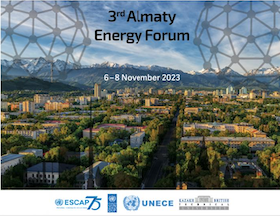Critical Raw Materials (CRMs) are essential for the production and deployment of low-carbon technologies, such as wind turbines, solar panels, electric vehicles, and batteries. However, they also pose significant challenges regarding supply, demand, environmental and social impacts, and governance. Central Asia has a rich and diverse mineral resource base, which includes mineable reserves of most CRMs, such as lithium, rare earth elements, and uranium. However, the region also faces challenges regarding environmental and social impacts, governance, and regional integration of CRM production.
A joint session by UNECE and ESCAP at the 3rd Almaty Energy Forum, explored how UN frameworks and tools can help Central Asia address the challenges and enhance the opportunities of critical raw materials for the low-carbon energy transition and Sustainable Development Goals. The session concluded with actions for enhancing the understanding and application, strategic roadmap development, capacity building, collaborative network formation, and policy advancement of CRM development and management in Central Asia using United Nations tools.
UNECE highlighted the benefits of using the United Nations Framework Classification for Resources (UNFC) and the United Nations Resource Management System (UNRMS) to address these challenges and enhance the opportunities for CRM development and management in Central Asia. UNFC and UNRMS are frameworks that provide a holistic, harmonized, and sustainable approach to the assessment and monitoring, investment and financing, circular economy and sustainability, regional cooperation and integration, and global goals and transition of CRM projects.
ESACP highlighted the newly developed Critical Energy Transition Materials (CETM) Sustainability Assessment Tool, which provides a structured set of indicators to assess CETM sustainability based on four criteria: economy, environment, social, and governance (E2SG), using a numerical coding system. The assessment tool aims to provide both quantitative and qualitative results, with the potential for the future development of a CRM Sustainable Development Index and Scorecard.
The session also showcased the initiatives and best practices of other partners in supporting CRM development and governance in Central Asia. “New technology, infrastructure and investments are required for Central Asia to benefit from the impending mineral boom” said Professor Chokan Laumulin, Kazakh-British Technical University, and Vice Chair of the UNECE Committee on Sustainable Energy. “A new generation of scientists and technologists need to be empowered with the UN frameworks to balance the recovery of critical minerals, their value addition and making the life cycle of the operations sustainable.”
The session emphasized the potential of Central Asia to become a significant global supplier of CRMs by 2030, creating a huge market value and generating thousands of jobs, reducing its greenhouse gas emissions significantly and contributing to the global low-carbon energy transition and the Sustainable Development Goals. Discussions encouraged the adoption and implementation of UN frameworks and tools for CRM development and management in Central Asia and to reinforce collaboration between stakeholders.


